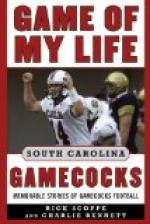Mr. Black, the slave hunter, was very poor, and had a large family; he had a wife, with eight or ten helpless children, whom I knew as well as I did my fellow negroes on the colonel’s plantation. But as cruel as Mr. Black was to runaway slaves, his family was almost wholly supported by negroes; I have known in some cases that they stole from their masters to help this family. The negroes were so kind to Mr. Black’s family that his wife turned against him for his cruelty to runaway slaves.
I have stated that some of the masters and overseers hired the hunters, on condition that they would capture and return the runaway slaves, unbruised and untorn by their dogs; while others, in a mad fit of passion, would say to them, “I want you to bring my runaway nigger home, dead or alive.”
All of the slave hunters used to practice cruelty upon the runaway slaves; more especially upon those whose masters would say to hunters “bring them dead or alive.” But among all the slave hunters in the part of South Carolina where the author of this work lived, Mr. Black was the most cruel.
It was rumored that many of the runaway slaves that were never heard of afterward, were captured and killed in the woods by Mr. Black, but no special clue to this could be found. Finally Mr. Black was hired to capture a runaway slave in Barnwell County, S.C. This slave was with another, who was thought well of by his master, but hated by the overseer. In the chase, the two runaways separated, and the dogs followed the second instead of the one whom Mr. Black had been hired to hunt. Mr. Black had another hunter with him by the name of Motley. The negro killed several of the dogs, and gave Messrs. Black and Motley a hard fight. After the negro had been captured, they killed him, cut him up and gave his remains to the living dogs.
The companion of the murdered slave was not caught. A few days after the chase, while wandering around in the wood in a somewhat excited state, he came to a spot where the bushes and leaves seemed to have been in a stirred-up condition, as though there had been tussling by two parties. On looking around in this disordered spot, he found pieces of clothing here and there in rags, looking just like the suit worn by his companion, who was then a victim of a most cruel death from the hands of the hunters. On closer examination, he saw spots of blood here and there upon the leaves, which awakened his suspicion; on looking a little way from this spot, he saw some leaves which looked as though they had been moved by hands and put there, and on removing the leaves, he found that the earth had been freshly dug and filled in again. Digging down in the spot, he soon discovered pieces of the person of a dead man, whom he could not identify, but was satisfied that it was the remains of his companion, from whom he had been compelled to separate a few days before. This sight frightened the runaway negro so, that he left the woods, went home to his master and told the story; but as a negro’s word was not to be taken against a white man’s in the days of slavery, no special notice was taken of what he had said. Still some of the white people were secretly watching Mr. Black, the slave hunter, as he had been before suspected of killing runaway slaves in the woods.




